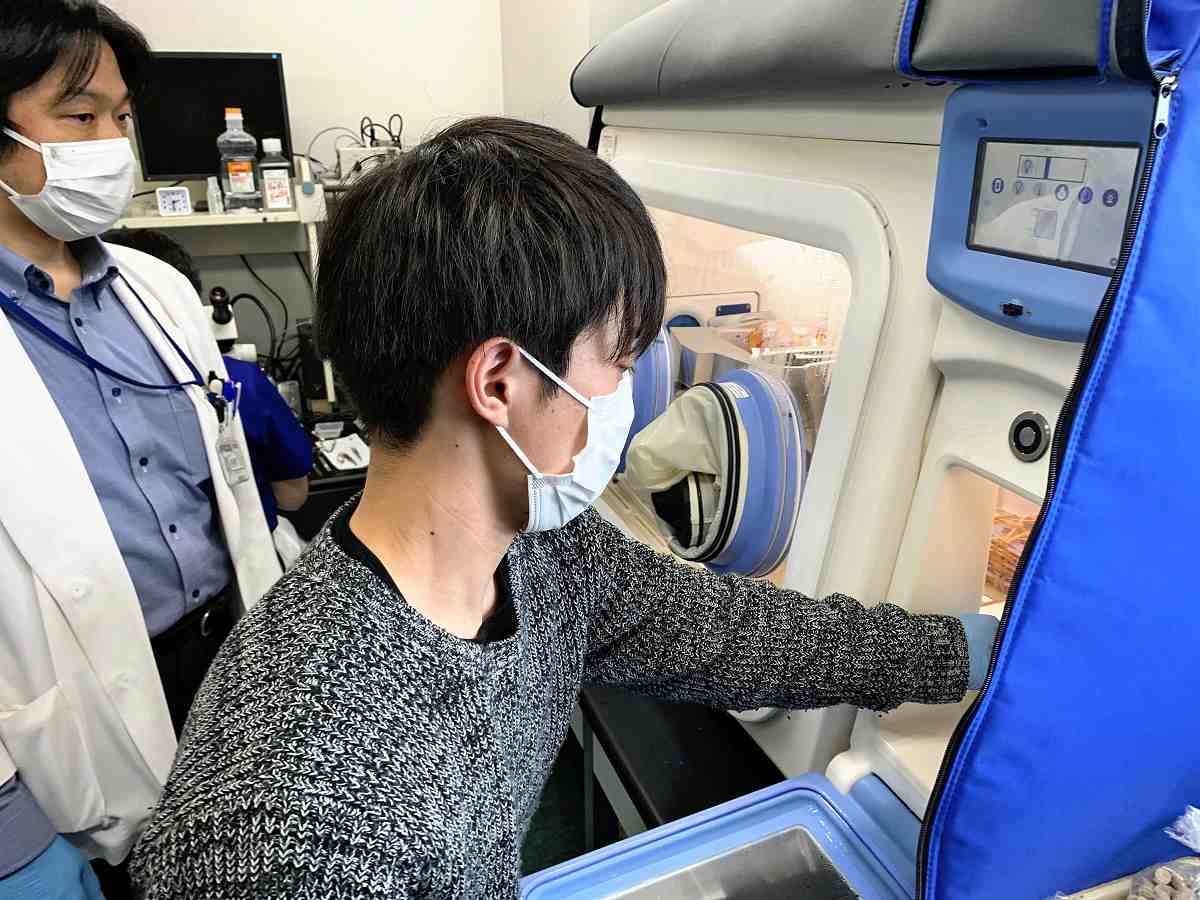
A student learns how to create a microgravity environment in an experiment conducted at Jikei University School of Medicine.
1:00 JST, May 19, 2023
Universities are educating so-called space personnel in anticipation of an era when people will be living on other planets and the moon.
Professions include doctors and nutritionists who manage astronauts’ health in outer space and AI experts who lead exploration activities.
The government is also supporting the development of specialists in various fields to keep pace as countries around the world ramp up space-related activities.
Kyoto University, in collaboration with other universities, has been promoting since October an educational project to foster human resources in “astromedicine.” Students attend lectures, conduct experiments and visit research facilities in the space field. In February, students conducted a medical experiment at Jikei University School of Medicine in Tokyo using a device that reproduces a microgravity environment.
“It’s essential to have personnel with a medical perspective in the special environment of microgravity and strong radiation in space,” said Kyoto University Program-Specific Associate Prof. Masahiro Terada, who is in charge of the program.
The U.S.-led Artemis lunar exploration program, in which Japan participates, plans to send astronauts to the moon in 2025. The exploration of lunar resources and the construction of facilities will begin.
Businesses such as space travel corporations are also emerging. Some estimates predict the global market for space travel will reach $13 billion (¥1.8 trillion) by 2033.
However, there is a shortage of human resources. According to the Economy, Trade and Industry Ministry, about 11,000 people in Japan are working in the space industry, less than one-tenth the number in the United States, where more than 150,000 are involved in the field.
The Education, Culture, Sports, Science and Technology Ministry has allocated ¥500 million this fiscal year for projects such as the development of human resources in the space field.
Kanazawa University and other institutions are participating in the project, and they have begun teaching students from high school to graduate school how to use AI in the space industry.
Tokushima University established in April a space nutrition course at its graduate school, teaching the diets and exercise necessary to stay healthy in space. The school, in cooperation with related academic societies, is considering granting new qualifications such as a “space dietician” to students who complete the course.
“I hope students will develop food that can be eaten in space,” Tokushima University Prof. Takeshi Nikawa said.
Top Articles in Society
-

Producer Behind Pop Group XG Arrested for Cocaine Possession
-

Man Infected with Measles Reportedly Dined at Restaurant in Tokyo Station
-

Man Infected with Measles May Have Come in Contact with Many People in Tokyo, Went to Store, Restaurant Around When Symptoms Emerged
-

Woman with Measles Visited Hospital in Tokyo Multiple Times Before Being Diagnosed with Disease
-

Australian Woman Dies After Mishap on Ski Lift in Nagano Prefecture
JN ACCESS RANKING
-

Producer Behind Pop Group XG Arrested for Cocaine Possession
-

Japan PM Takaichi’s Cabinet Resigns en Masse
-

Man Infected with Measles Reportedly Dined at Restaurant in Tokyo Station
-

Israeli Ambassador to Japan Speaks about Japan’s Role in the Reconstruction of Gaza
-

Videos Plagiarized, Reposted with False Subtitles Claiming ‘Ryukyu Belongs to China’; Anti-China False Information Also Posted in Japan
























